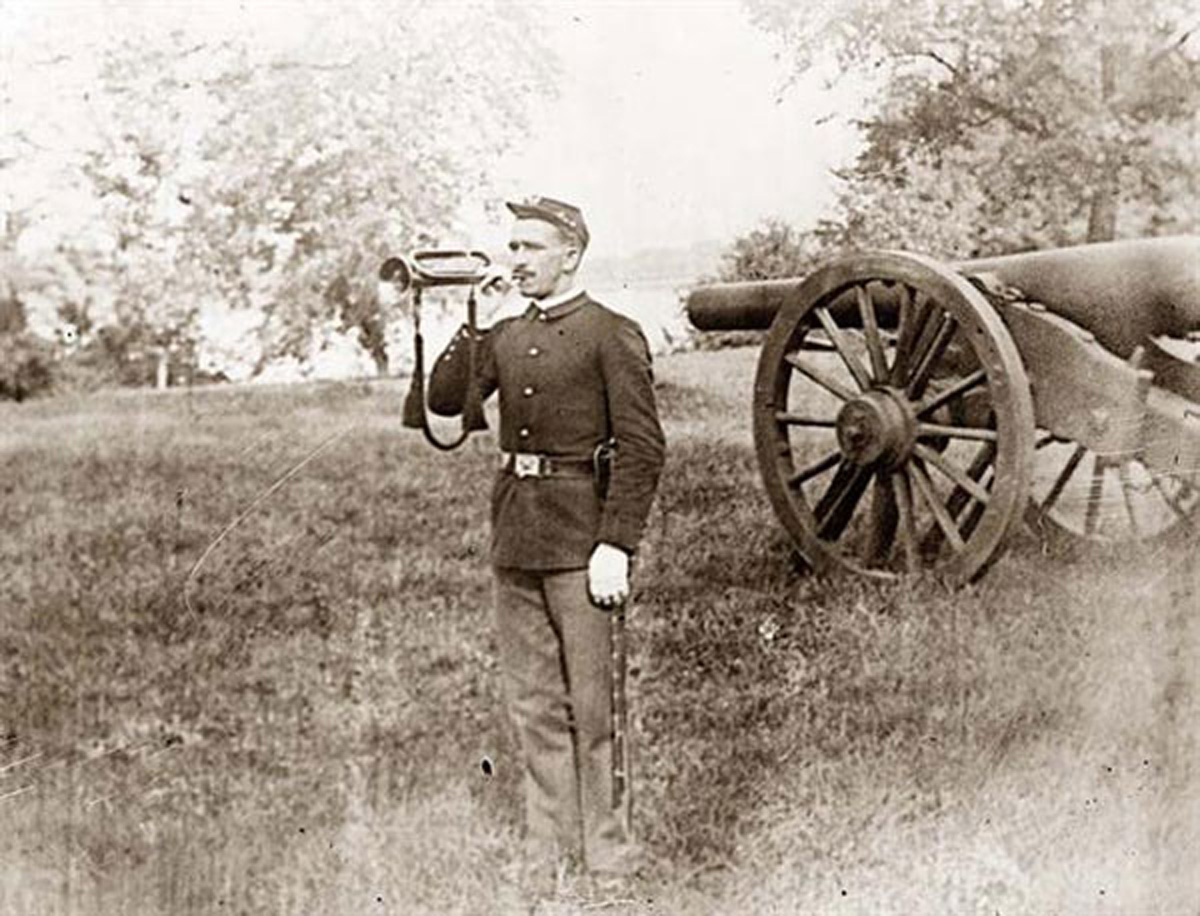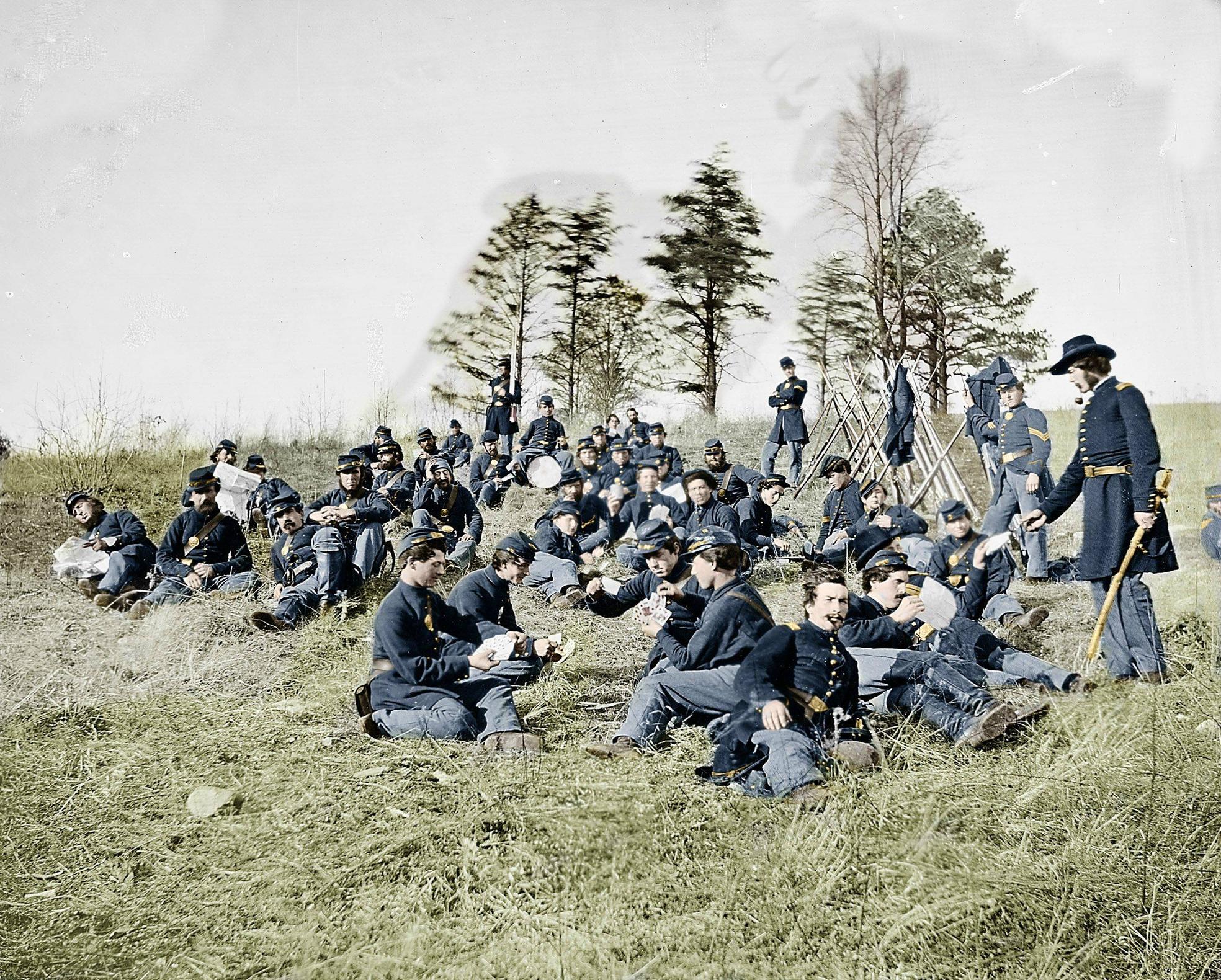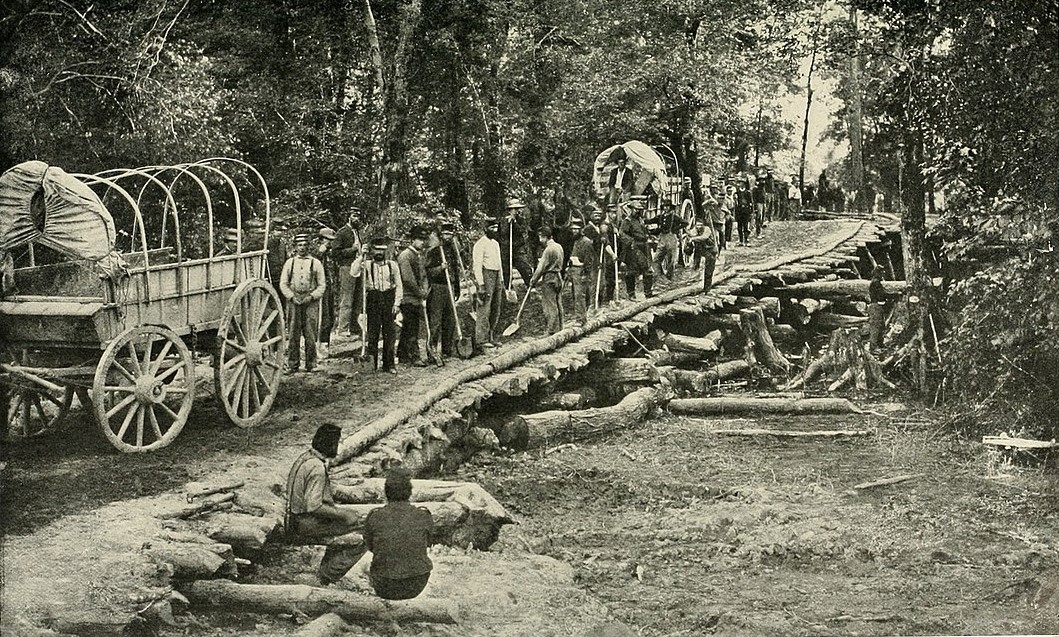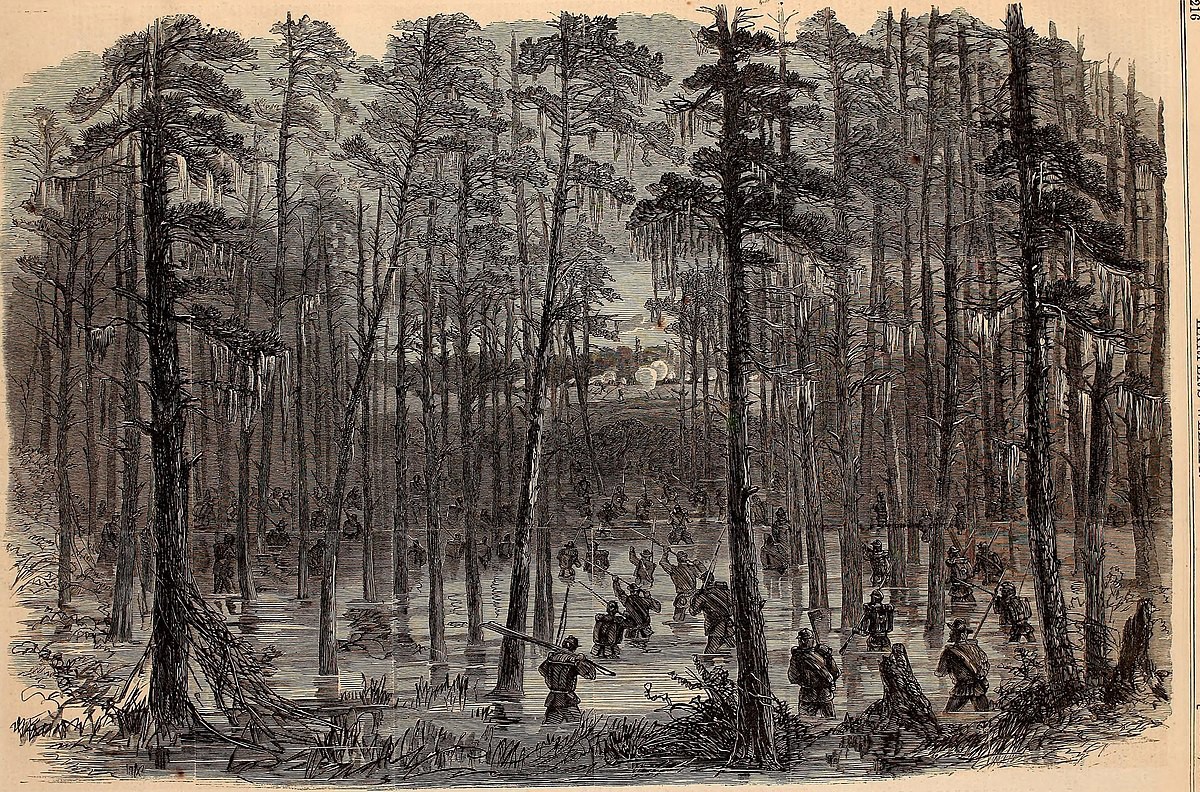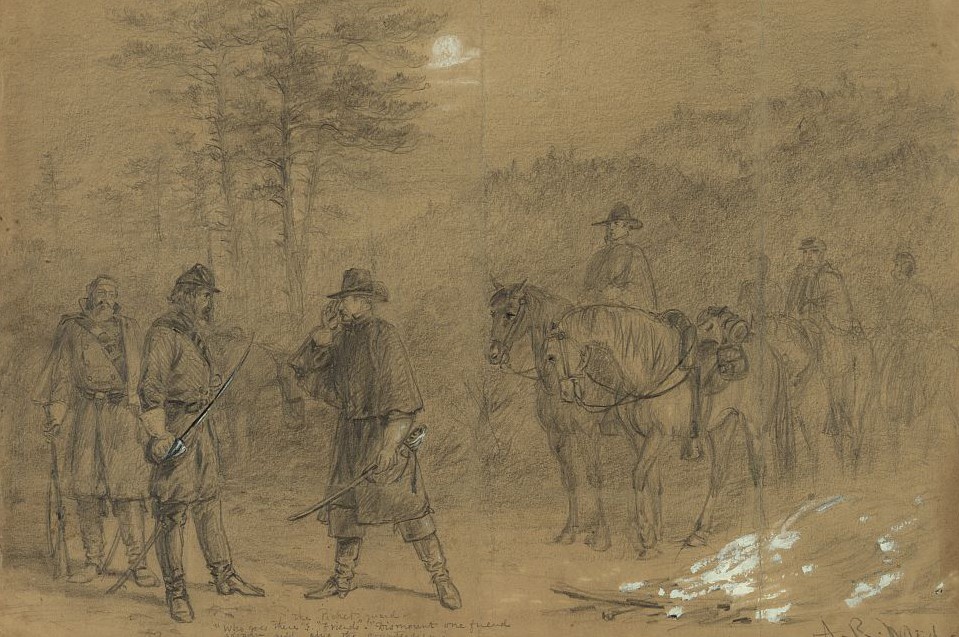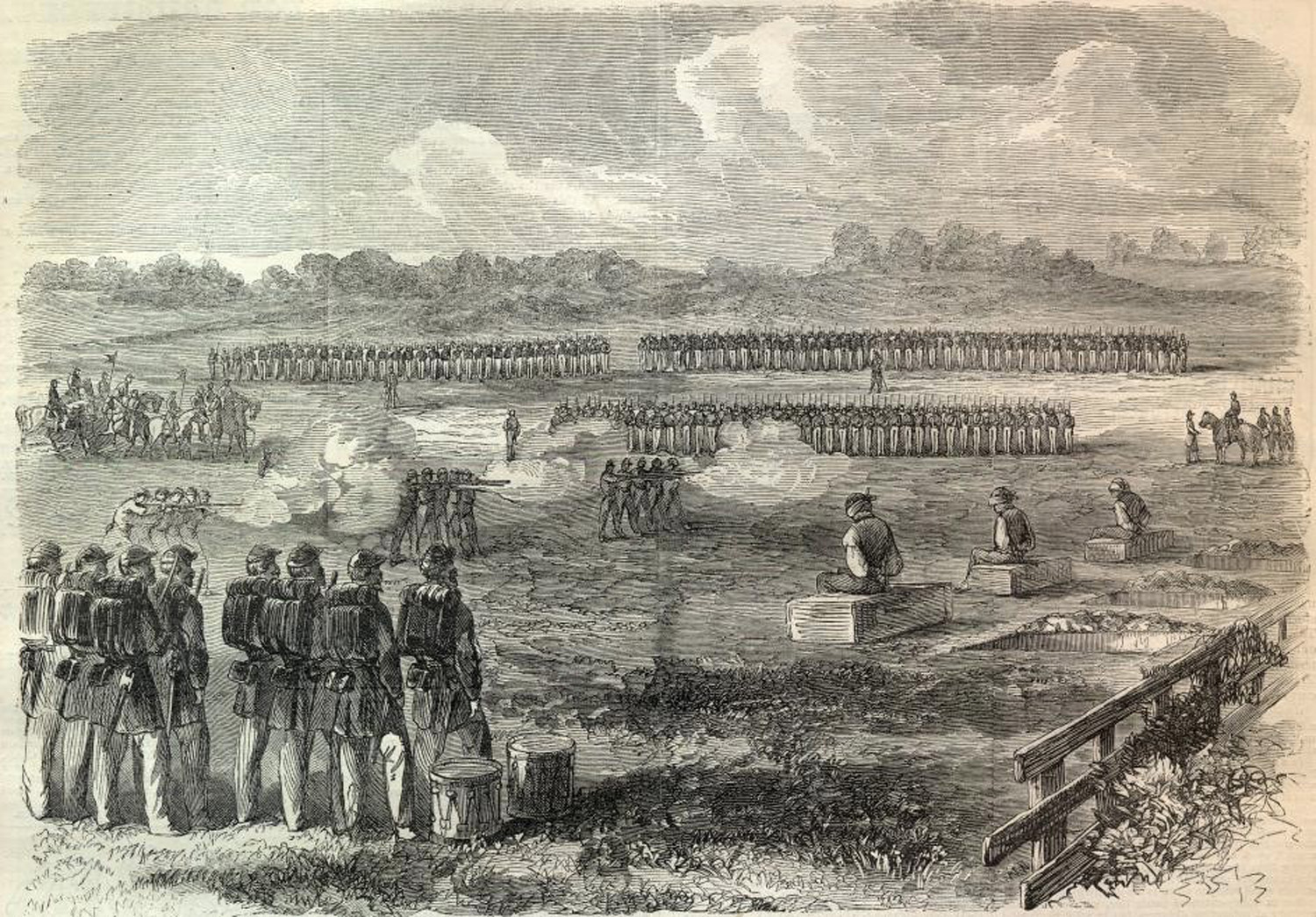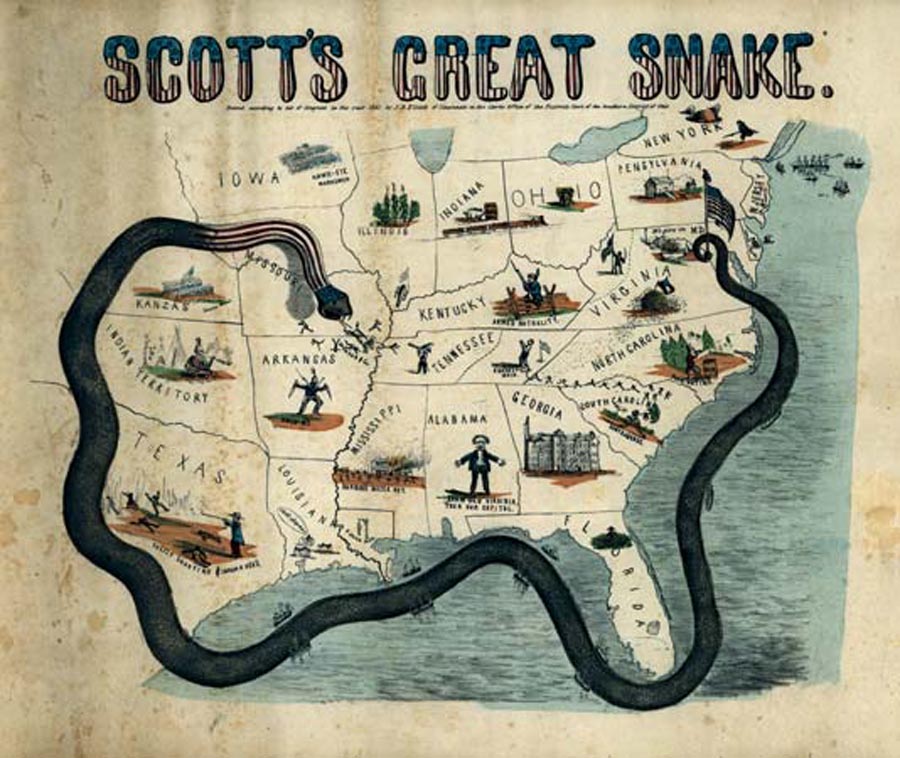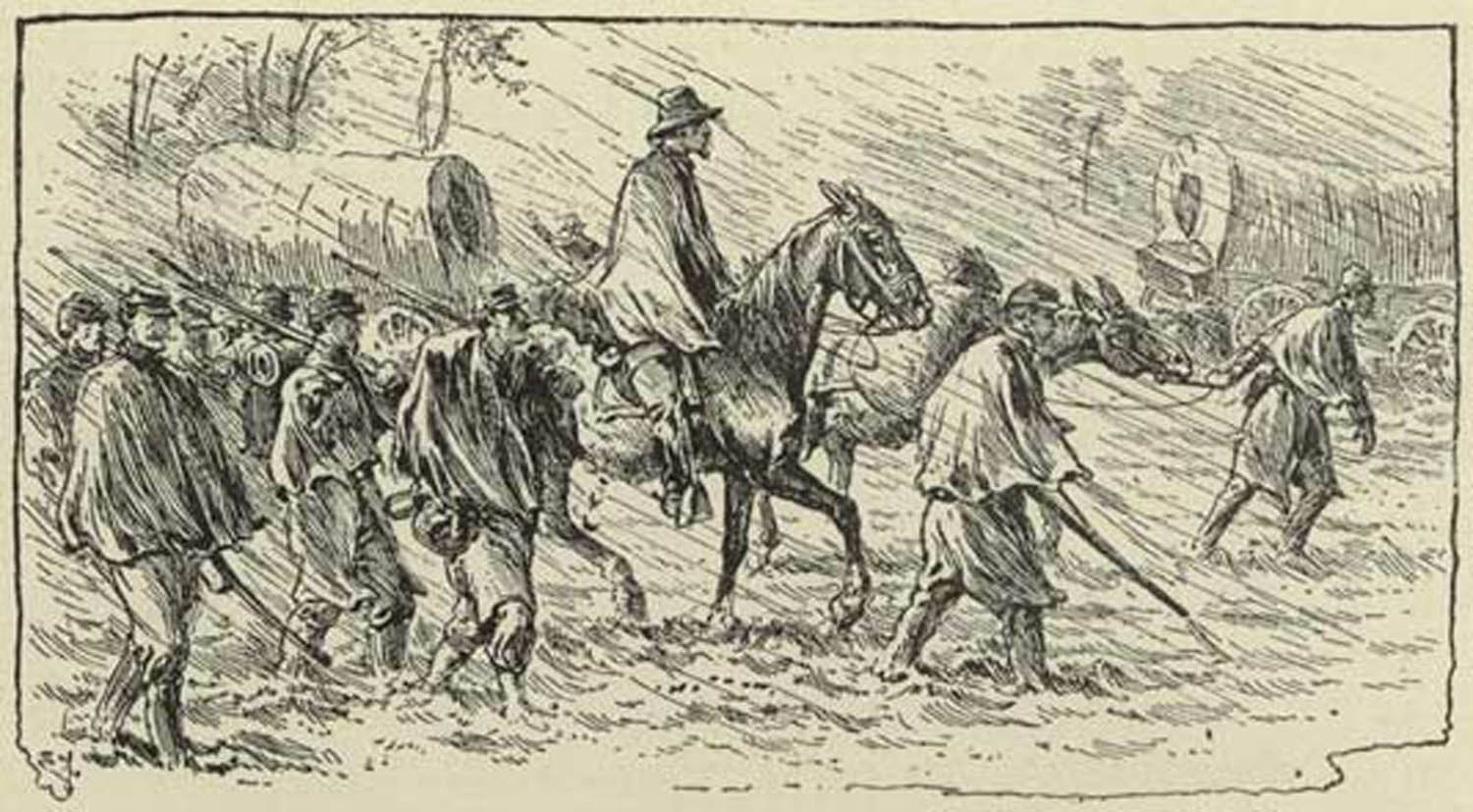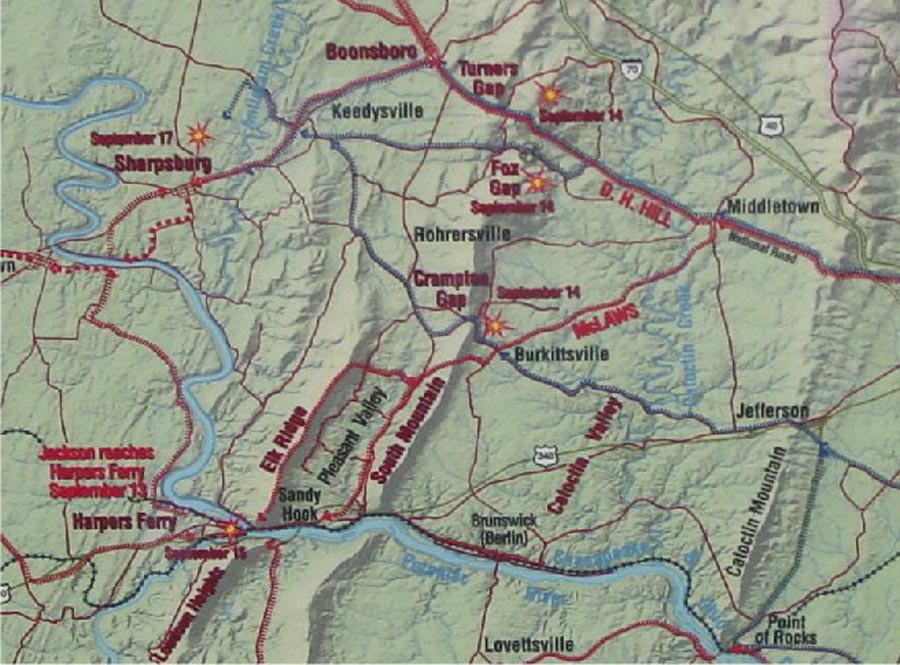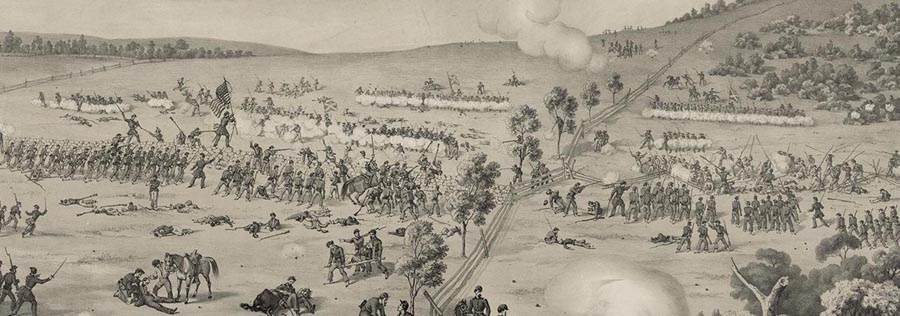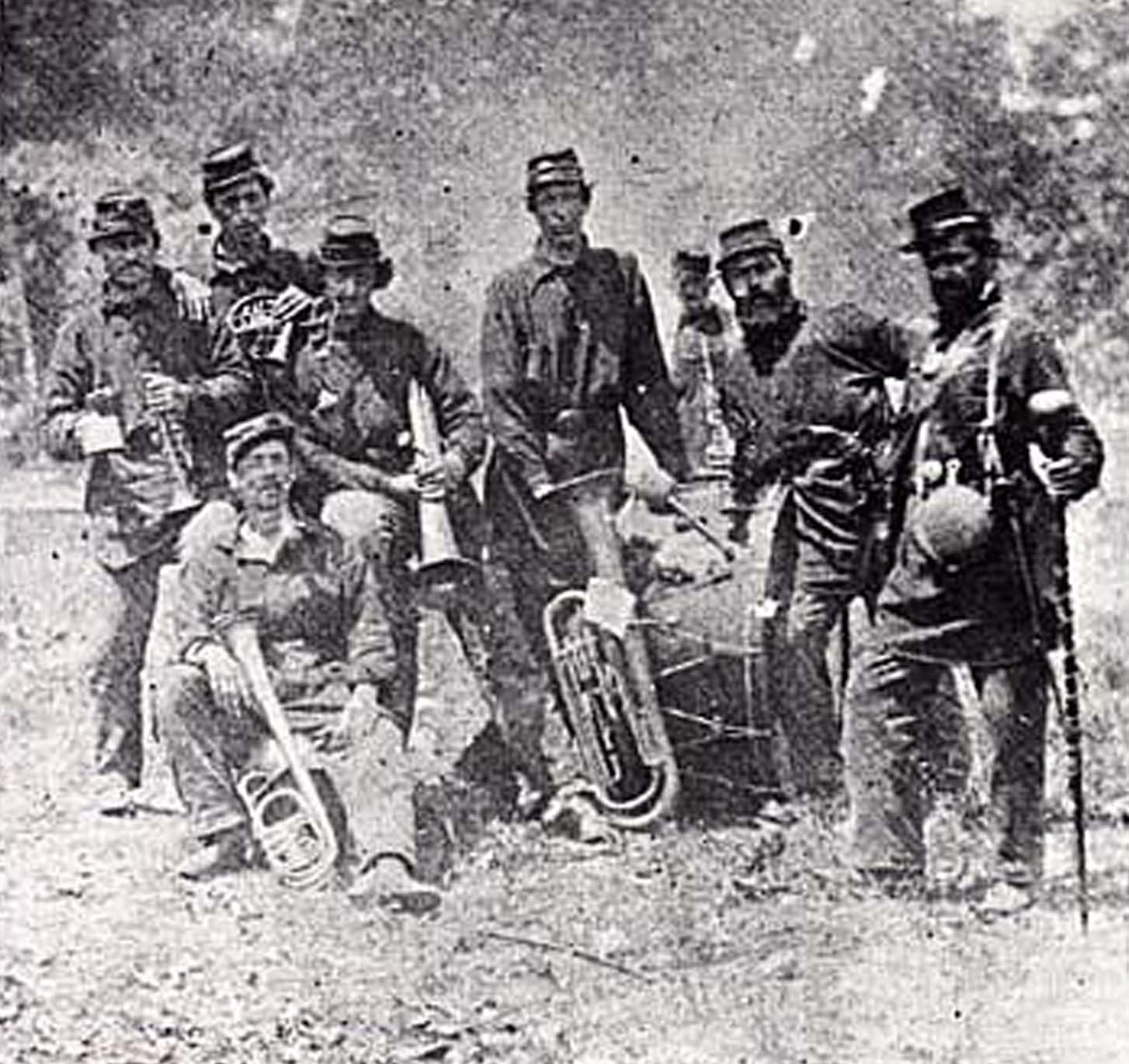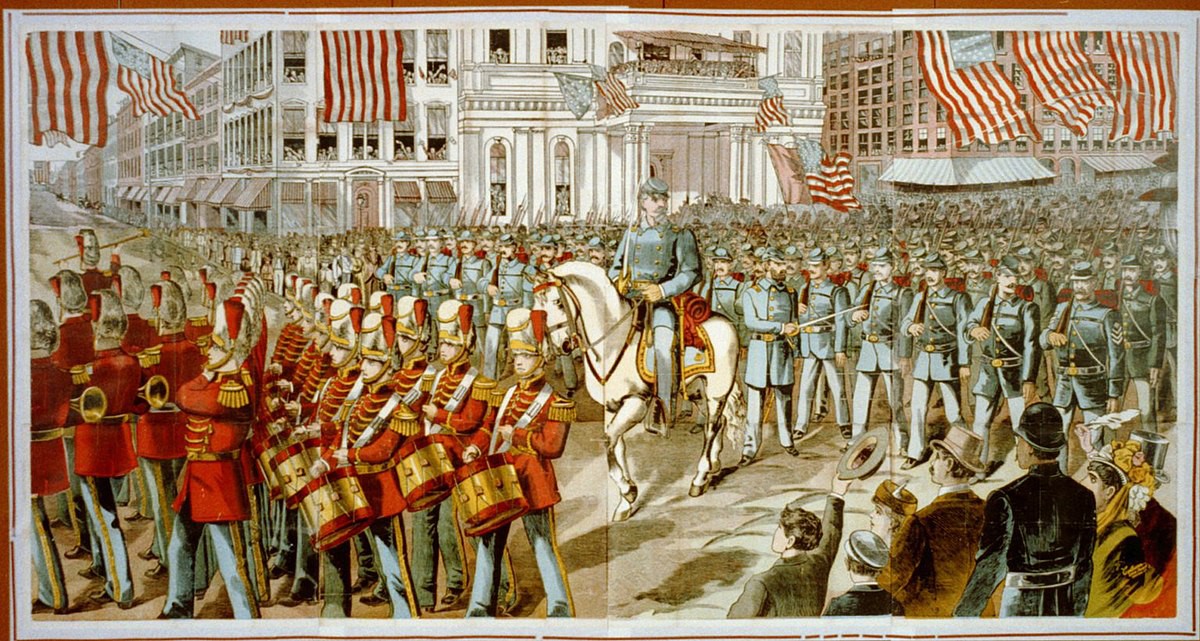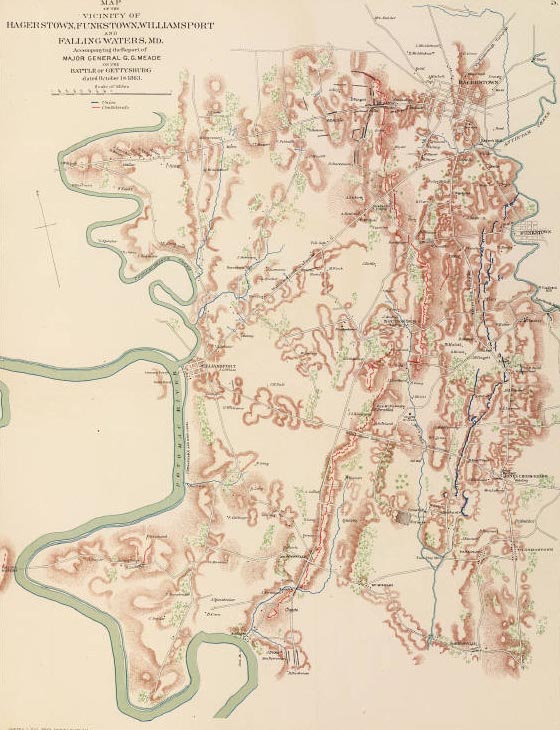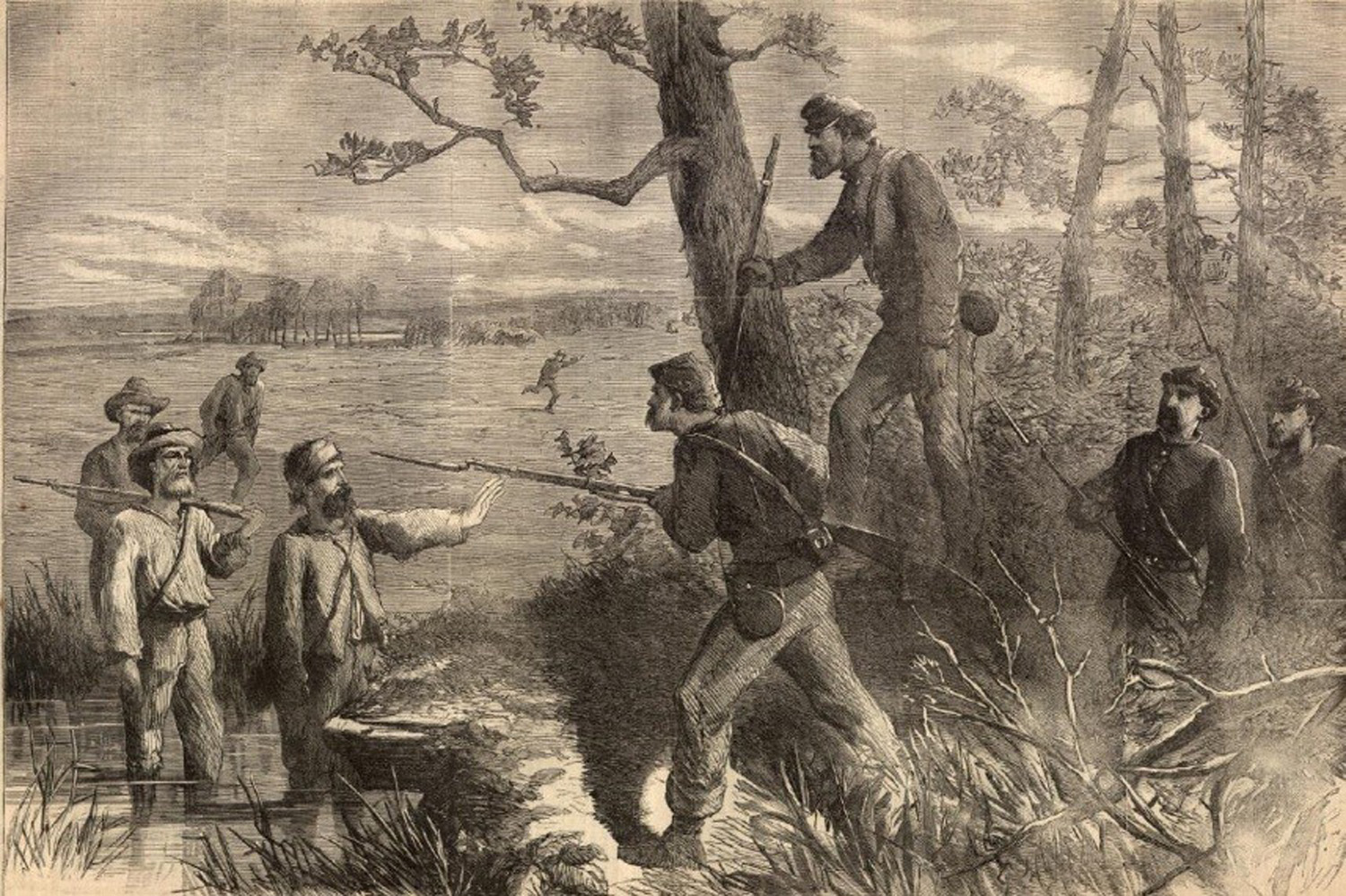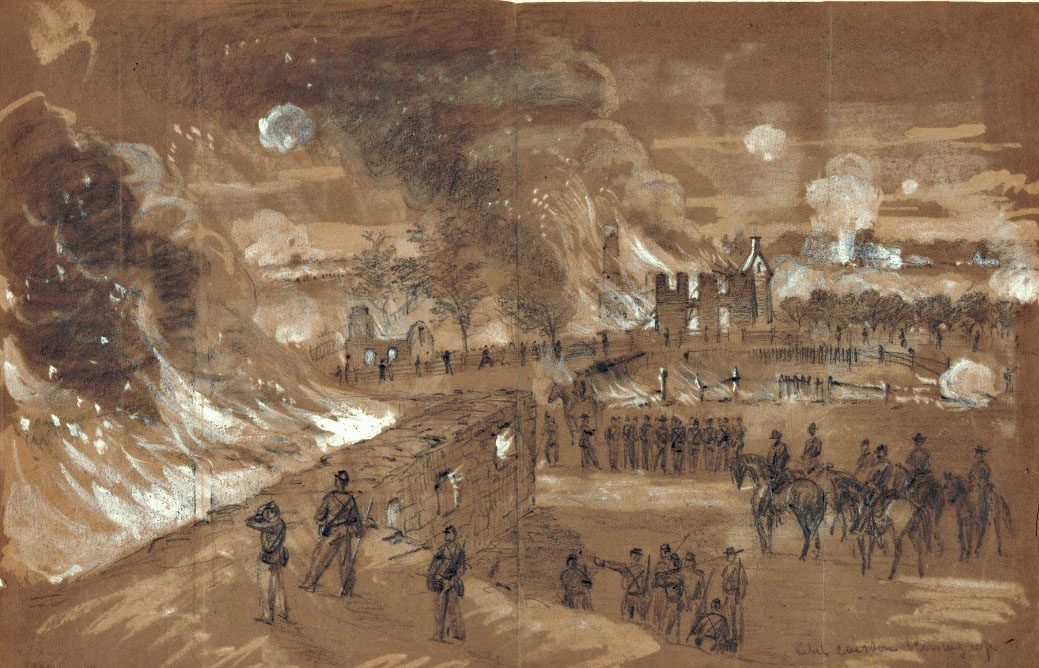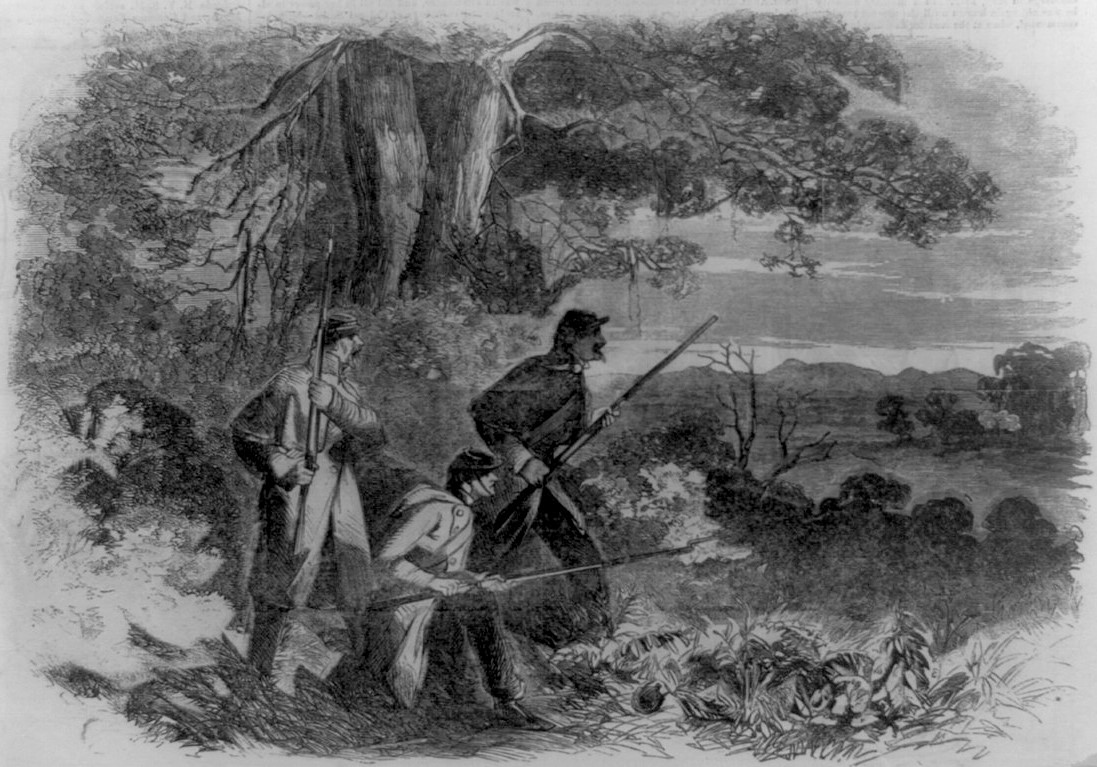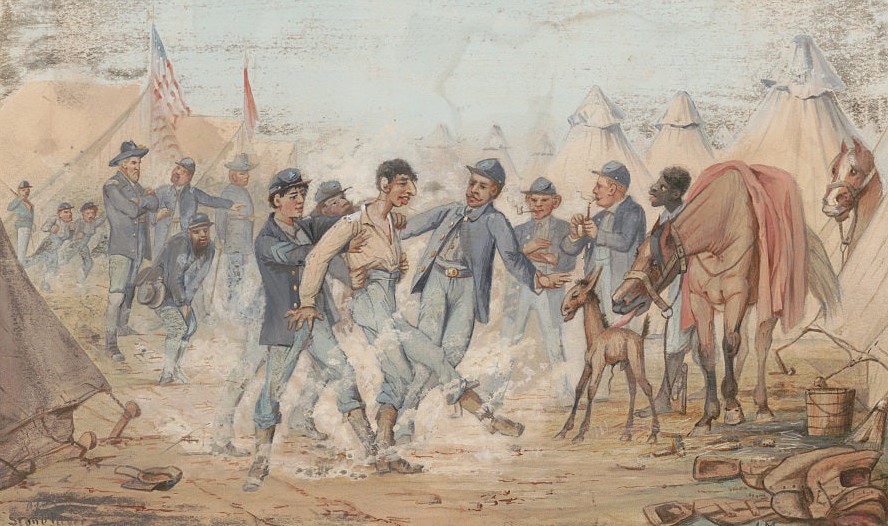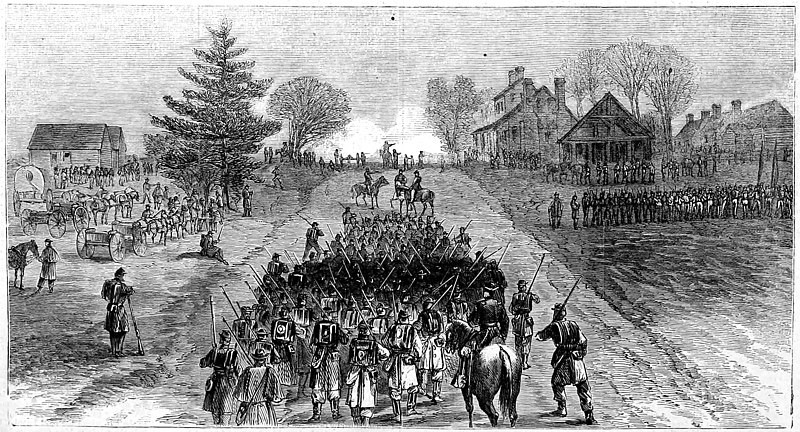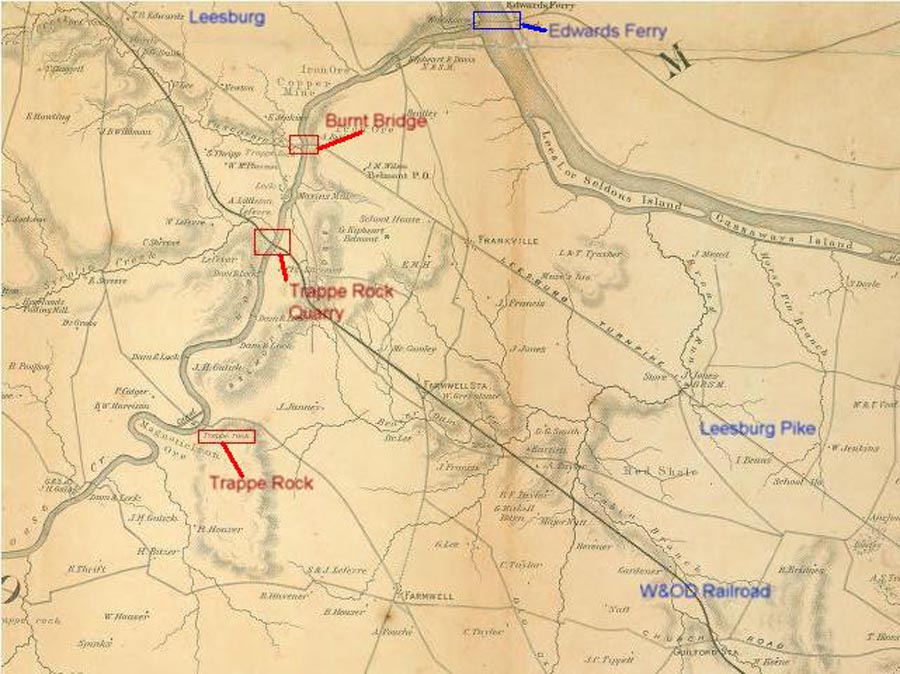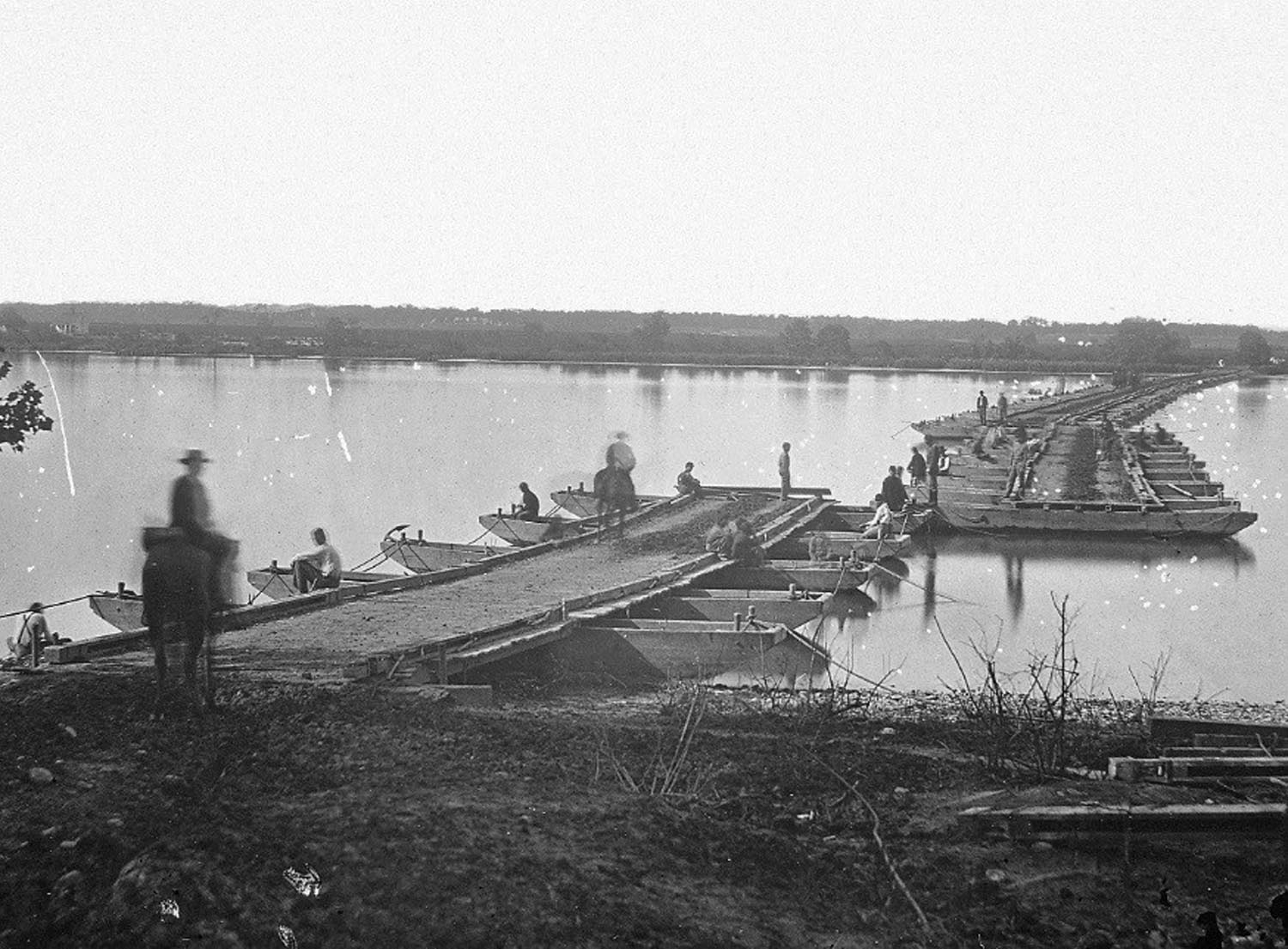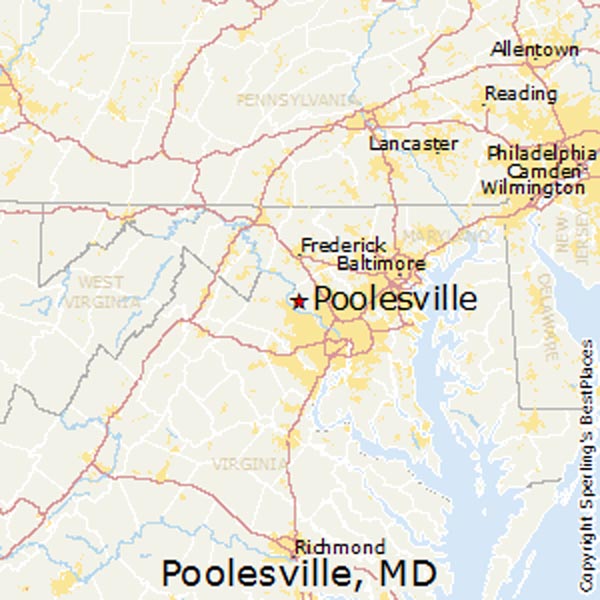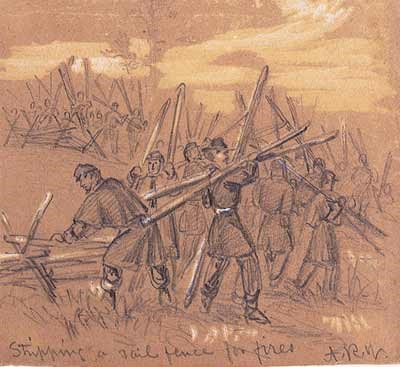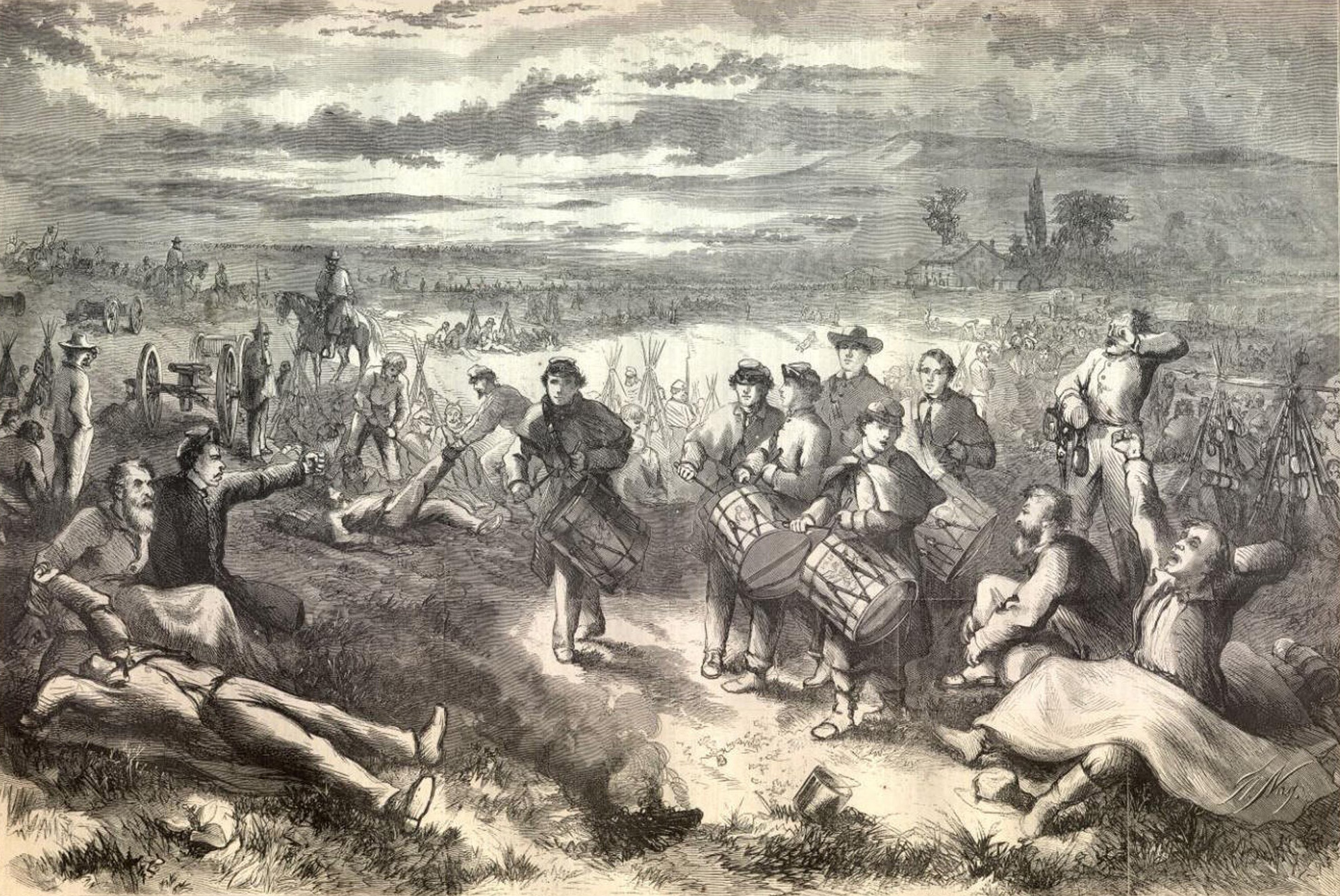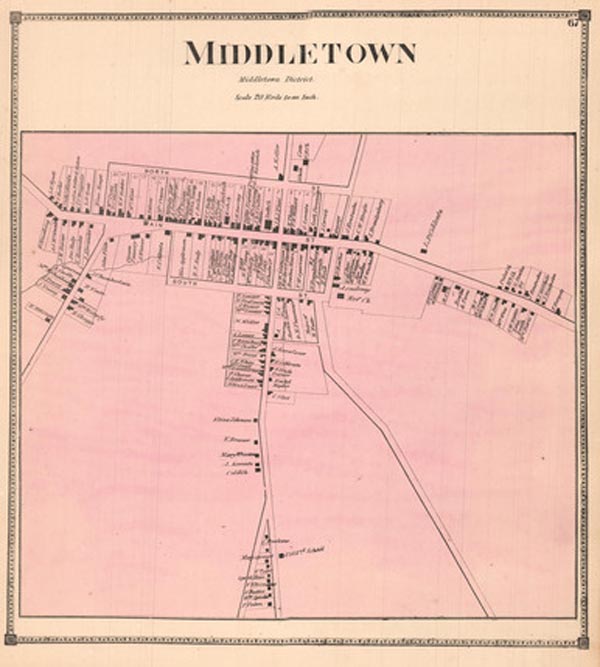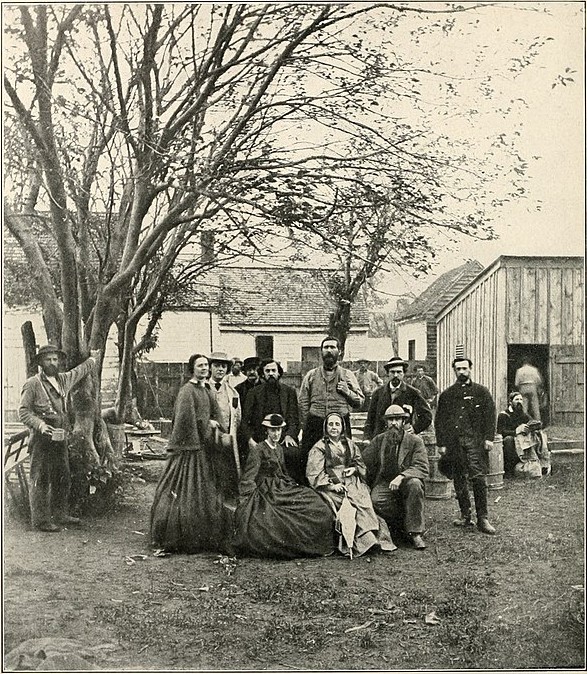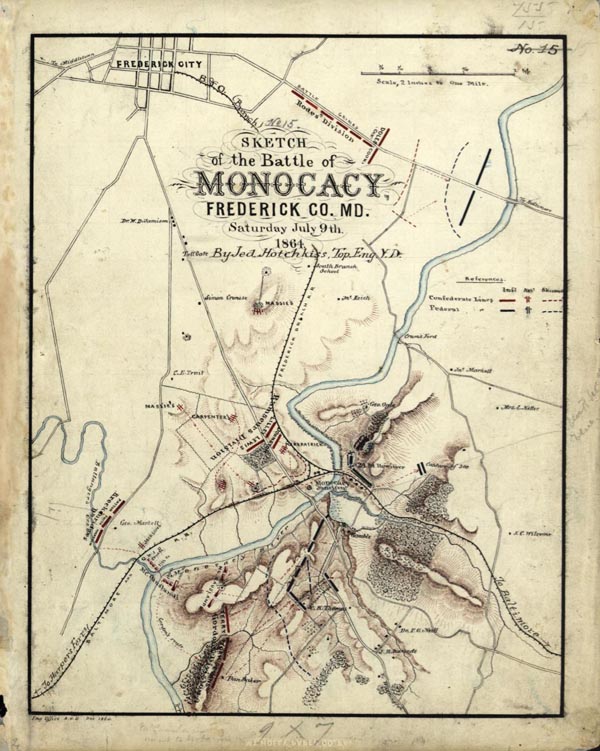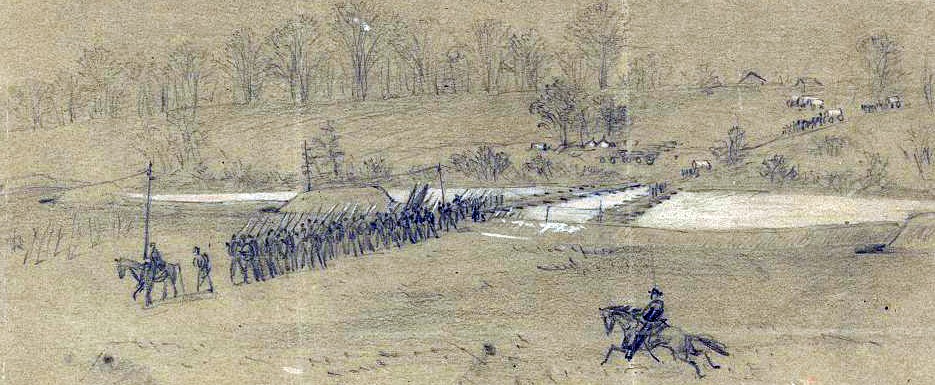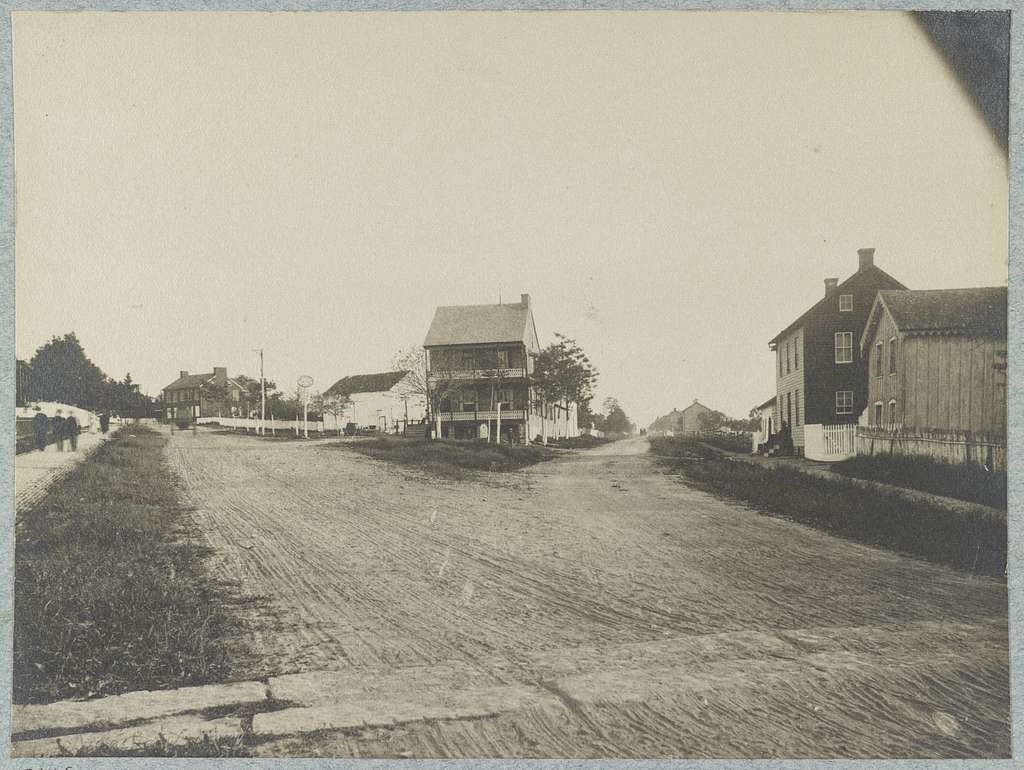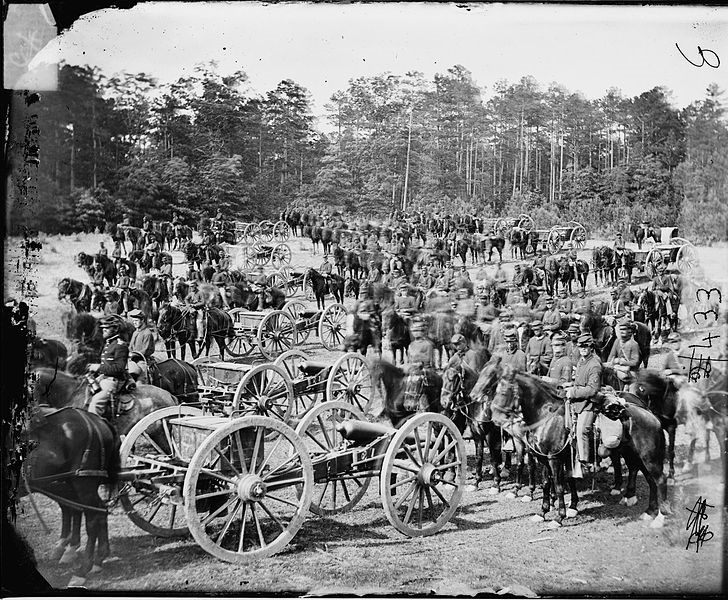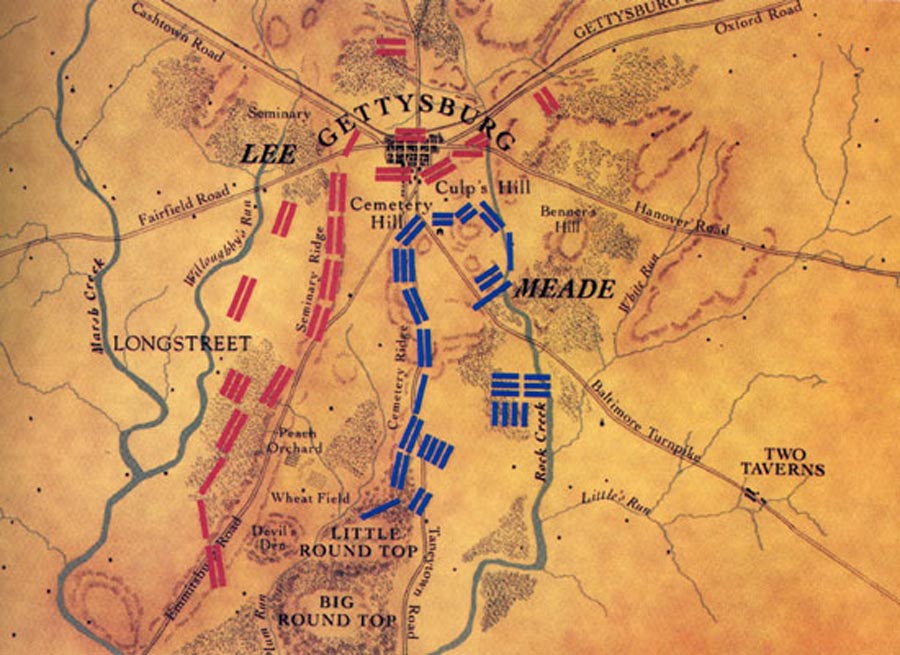Company bugler
As the company got in line, David looked down across the meadow. He saw some of the Germans soldiers going after a drove of geese. They were using a long pole with which they were knocking the heads off the geese. This was, to him, a new way of killing geese.
After marching a few miles, the column came to a small creek. Here they were ordered to fill their canteens. They were told they would not again find water for twelve miles. They kept in ranks for about ten miles. The water had given out, the sun was scorching, and David commenced to get sunblind. He had to join the other men sitting under the trees. Sometime later, after getting some rest and relief from the heat, David took out his diary again. He quickly jotted a few lines before the men were back on the march again.
No date:
I told my tent mate Chunky I would drop in the shade a few minutes, and he said he was with me. We stopped about fifteen minutes then went on. The road was lined with men who were occupying every shady place.
Union soldiers taking a break
The column marched through the fields and came to a wood road. Chunky told David, and they both agreed that the going was better on the road than in the fields. How far they tramped in the woods was anybody’s guess. But they all did know; the pickets were nowhere to be found, and their guides were hopelessly lost.
A wood road
The problem was simple. The column had passed through their own picket line, and it was not safe to return that way in the darkness. Chances were that somebody might get hurt, and they had no way of knowing where the Rebel army would pop up.
The column had passed through their own picket line
Orders were given to the men in a whisper, “Make yourselves as comfortable as you can and no noise about it.” The officer’s tone of voice reminded David of his own mother’s way of getting him down for the night.
But, at this time, in this place, he knew no one would be tucking him tonight, and he hoped, especially not Johnny Reb. Undercover of their blankets and each leaning on the opposite side of a tree, Chunky and David were soon fast asleep and did not wake until daybreak.
The sunrise did not wake the two men, but they found that they had spent the night in two inches of water. They were both wet and cold. It was not the first time for either of them sleeping in a mud hole; it was nothing new.
Chunky brought a smile to David’s and the other men’s faces when he chuckled in a fake southern accent, “Yawl, this is the first time since we started this here march that I have moe water than I needed.”
The laughter spread across the awaking men like a wave until the officers quitted then down. They still had a good chuckle anyway, and they all felt a little better, if only for a moment.
Now there was enough light to see through the morning mist that still clung to the ground, so the men started back towards camp. As far as anybody could figure out, it was about two miles back, just at the edge of the woods. They soon came into the picket line that some of them were supposed to relieve that evening before.
Picket guard
The reception by the pickets was mixed with a good deal of profanity. The men on guard all night were silenced by informing them of how bright they had been to allow three hundred men to pass through their lines unobserved. Then the pickets were relieved.
During the time soldiers spend on the battlefield, there are moments of great excitement and long periods of boredom. Both of these experiences have a diminishing effect on men’s morals. Several of them became restless, and all were thinking about home. Even though David now had free time, he did not always want to write down his memories. Somethings he just tried to forget. But when the inspiration came to him, he wrote.
No date:
Nothing occurred during this time except we were ordered to fall in one afternoon, and were informed that three deserters were to be executed in our camp that morning. I was very glad that I did not get chosen for the firing squad. Even though it is hard to fire on the enemy, it would be very difficult to fire on one of our own men. I know two of them personally but never met the third man. I wonder what their families will think? I don’t see much in it only that such was the doom of deserters, and I supposed was intended to give us a pointer not to desert.
The execution by firing squad of three Union deserters
In the morning before the other men awoke and still under his blanket, David put his feelings to pencil.
NO date:
…Wet to the skin…rain high wind… cold…
Soon he could hear the crackling of a small fire, and he was sure that was hot coffee he smelled. But to his disappointment, it was Louisiana chicory they had confiscated from the Rebs brewing in the pot. During the American Civil War, Louisianans looked to adding chicory root to their coffee when Union naval blockades cut off the port of New Orleans.
Anaconda plan proposed by Union General Winfield Scott
With shipments coming to a halt, desperate New Orleans looking for their coffee fix began mixing things with coffee to stretch out the supply. Acorns or beets also did the trick. Though chicory alone lacks the alkaloid that gives you a caffeine buzz, the grounds taste similar. And they could be sold at a lower rate. So after a cup of hot chicory, poor man’s coffee, he continued writing in his diary.
No date:
It rained all night, and we were wet to the skin, spent a miserable night, and after the usual old bill of fare in rain and high winds. The command came to fall in, and then we got ready to march through Jefferson. The band struck up a jig, the boys gave a cheer, and the ladies waved their handkerchiefs, and the remarks made were, ‘who wouldn’t be a soldier?’
A march in the rain and mud
Passing through mud from four to six inches deep, baggage wet and heavy, the men passed on to the battleground of South Mountain, near Burkettsville.
Battle ground of South Mountain, near Burkettsville
As the men marched along, they found a good many graves, mainly of New Jersey troops. One brigade was sent into this place to guard the gap created by the day-by-day changing of the Union Lines.
Brass bands of the Civil War
The band with Chunky went along with them, being part of the larger group. David and the rest of the corps went by another road to Middletown, where they all met up later. Chunky and the band again led the Brigade when they joined David’s Corps between Middletown and Hagerstown.
Union soldiers and band marching through a city on their way to war
Hagerstown, Funkstown, Williamsport, and Falling Waters
The company moved on a few miles further and then made camp on the banks of Goose Creek by a mill dam. It was a splendid place to swim, and everybody took a bath. When the rear guard came into camp in the afternoon, they brought with them about a dozen to fifteen long-legged narrow-chested pleasant Virginia farmers. They had their hands in their pockets and stood round-shouldered like ‘a hound in a mush-pot.’ They were held under a strong guard.
It rained some during the night, and they were the picture of distress the following day. David learned overnight from Chunky that two men had had their ears cut off and that two other men had been found with their throats cut. They all belonged to their Brigade. This was the reason for bringing these innocent, peaceable farmers into the camp. What was done with them, no one ever said. To most of the men, they all looked as if ‘hanging might be too good for them.’ David told Chunky, “I always had respect for a man who being an enemy, would declare himself such and come out and fight. But I never had any love for those innocent bushwhackers”.
Bushwhackers
They remained camped on the banks of the creek till the afternoon. Then the order came to move about a mile back from the stream and encamped near a farmhouse. The old farmer they found there was a Rebel to the backbone. He would not take the oath of allegiance, and the boys took everything he had and would have carried off the farm, but he took the oath, and a guard furnished him a cigar. But no one would give the old dirt farmer a match to light it. They torched his farm instead.
Torching farm land
Along towards dusk, once again, it was David’s turn to be one of the seventy-five from the regiment that had picket detail that night. The men were marched to division’ headquarters, where they were ordered to load their guns. They were joined by other details from other regiments in all about three hundred men. Altogether they were placed under the charge of three mounted officers, which started them for the picket line. They were to relieve the pickets who were out on duty.
Pickets on duty
The night was pitch-dark, and they could not see the man that was in front of them. So, to keep together, each man took hold of the coattail of the man in front of him. They had to cross fields that had ditches that heavy rains had washed out. It was no uncommon incident to find five or six men on top of each other in a ditch or the same number taking a tumble over a big stone. Sometimes when the man in front took a short step and the man following behind him made a short step, then all the men, when they passed that spot, took a short step to keep from falling. Their relief came at dawn, and after arriving back at camp, the men slept right through breakfast.
Tired men
On the afternoon of the 24th, the company was notified to pack. The men were well-rested, and most of them felt ready for the road. The afternoon’s march was only eight or ten miles to Edwards Ferry on the Potomac River.
The afternoon’s march
Edwards Ferry
The order came down to make camp near a farmhouse on a bluff, half a mile back of the river. The company waited there for the completion of the bridge that was still under construction.
Building a bridge
This gave David the free time to get with Chunky and make some coffee. The two friends did not see each other much these days, but the time spent together made them feel like things would be all right. Later the diary was brought out for some writing by the campfire.
June 24, 1863:
Today we had just a little fun. Our neighbors in one of the German regiments had found a sow and ten pigs, the pigs were nice and plump, about ten weeks old. They were nice for roasting. The Dutch had killed all the pigs by the time I got around, and were just going for the old sow. She was about five feet long and three feet high and six inches wide. They had caught her and were holding a council of war over her. Some wanted her killed; others thought she was too lean. Able remarks were made on both sides. The final decision was to let her go, and she was pardoned.
The men retired to their bunks early because of indications that they were to have a hard day’s march on the morrow. Even the officers did not know at what hour they might take a notion to start moving again.
June 25, 1863:
Reveille sounded before three o’clock, and we were early crossing the pontoon bridge, which seemed to be a mile long. By keeping step, we got quite a swing on it. We received many commands to break step. . . .but we felt like giving the officers a good swing and gave them a shaking up before we got across. But we also got our shaking up before night. We went through Poolsville and up the Potomac, then turned a north-eastern direction and crossed a mountain.
Poolesville,Maryland
It rained in the afternoon, a very cold rain. On arrival near Jefferson, MD., in the evening, we were tired and wet. We camped in a nice field. The farmer turned out three teams to haul cordwood to save his fences. But impatiently we made a raid on a fence, the order of the officer was that we should take only the top rail, which we did until we reached the bottom, and took that also if it was not rotten. We had cleaned up about one hundred rods of fence, by the time the teams arrived with the cordwood.
Steeling the farmer’s rail fence for firewood
In the evening, a brigade of cavalry came over the mountain riding into camp. They were the drunkest Brigade that anyone had ever seen. Officers and privates alike. David saw two privates trying to keep an officer on the saddle, and he also saw officers trying to keep a private in the saddle. Some of these men had to lay over till the next day before they were able to follow up their command. David found out later that they had struck a distillery, but he thought the distillery must have struck them.
Reveille awoke the troops at three a. m. By 4 o’clock, they were on the road to Middletown. As the men were marching past General von Gilsa’s Headquarters, the General was standing at the gate.
“Everybody wake up, morning”
To salute him, the Company Commander ordered, “Shoulder arms.”
At the exact same time, the General gave the command, “Arms at will.”
And when the soldiers did not obey promptly, he repeated the command. Then jokingly, he remarked, “You need not care for your little Major.” This caused quite a laugh in the ranks. The regiment was commanded on this campaign by the Major, and his men all love him.
Middletown
June 28, 1863:
The weather was warm, and there were many fine residences along the pike…. Cool shady places were occupied by the residents. .. .we would see the natives sit on their porches, with standing collars, shoes blackened, and smoking cigars. It brought a fellow back to see how folks live in god’s country, and what home comforts a fellow could have if he were only there.
Men and women sitting under a tree in a yard
To be honest about it this was the only day that I had the blues while I was in the army…. But it was tramp, tramp, all day long. . . .no halt until near an hour before sunset…. We were formed into platoons, front and closed up, and as I was pretty well in the advance of the column, and as the Hagerstown pike has a down grade into Frederick city, I had a grand view back over that column. The pike was packed full of infantry as far as I could see, and they were from 16 to 20 men abreast.
Battle of Monocacy, Frederick Co. Md
The gun barrels glistening in the evening sun made a sight never to be forgotten, and the troops kept on marching. The men began to feel hungry because they had breakfast between three and four in the morning, and all there was to eat was dry hard-tack. The minutes turned into hours, and still on went the columns. Some general officers passed along the columns after dark. Everybody thought Howard and Harlow were among them. It was a steady marching and no halt until 11 pm.
The men were ready for the road
The men were ready for the road a little after daylight on the following morning. The farther the army got north, the more loyal the people were. They met on the crossroads great crowds of men, women, and children. The country people lined the roads, gazing in open-eyed wonder upon the long lines of infantry. And as far as the eye could reach was the glitter of the swaying points of the bayonets.
Line of Union Soldiers
And along the farmhouses were set tubs of water for the troops to drink and water the houses. David had some hardtack in his haversack, and he figured that it would go down better with some freshwater. While he and the other men were resting, David made a note in the little book.
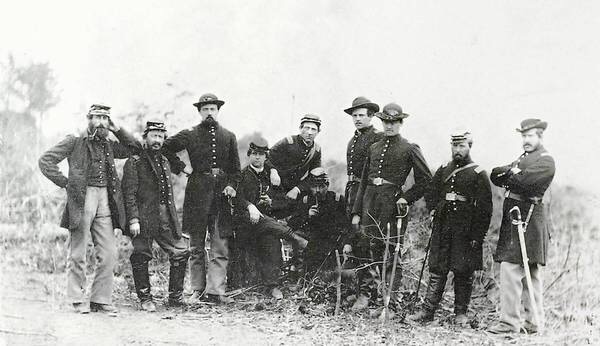
Officers of the 153 Pennsylvania Volunteers
June 30, 1863:
I never heard of any man, woman, or child being insulted … .we traveled through a very fine section of country this day and about six o’clock p. M. Arrived at Emmitsburg, all tired ….the sun came out, and we had a nice day …
Emmitsburg
During the day, we moved to the north of the town, where our artillery had taken up position, and had some works. For a man of 21, I feel 61 years old, my knees being stiff, it is with difficulty that I can walk.
The 2nd Artillery battery
A thunderstorm came up in the afternoon, and consequently, Chunky and David had to put up their tent in pouring down rain. They made camp the best they could while talking about something they remember seeing a ways back down the road. While the troops were marching through town, both men had noticed a nice bed of onions in a garden. Just about dusk, they returned to town and borrowed a few onions out of that garden.
The next morning the Company left for Gettysburg before the pickets came in. Consequently, the two boyhood friends got into that first day’s fight. The pickets did not get there in time to get into it, but they got a good dose in the skirmish line on the 2d day. They were all wounded, but one or two before the battle was over. Later the men could only account for one man named Rube, who did not get hurt.
No date:
. . .As near as I could judge the time, without a watch, it must have been after nine o’clock before we left camp. We went very slow starting out. At the state line we were informed that we were crossing into Pennsylvania, our caps went up in the air and gave three cheers for our native state.
The wagon train of the first corps had blocked the road, and we were delayed for some time on account of it. Then we started across the fields to the right, went through corn and wheat fields, till we got to another road, we had just gotten into this road when we saw a horseman coming at a fearful gallop. 1 thought he was riding a white horse, but when we got to the head of the column, I saw it was a gray and the lather on him must have been an inch thick. 1 also noticed that we began to step out faster, and it was not long till we saw another messenger with more orders from the front. I heard the boys say ‘there is another long envelope coming,’
As the bugle called general orders. We met five or six of these before we reached Gettysburg. After we had received the second one we got down nearly to a dog trot, and kept that gait until we got to Gettysburg.
Gettysburg Pennsylvania
When the Pennsylvania line was reached and crossed, what glad shouts went up from the Keystone boys of “Home again.” Some of the men bent over and kissed the ground. While still marching, David wrote a single line in his diary.
No date:
Alas, how many never left it but lie now mouldering in that silent city of her beloved dead!
>>>Click here <<<
Next: The battle of Gettysburg
